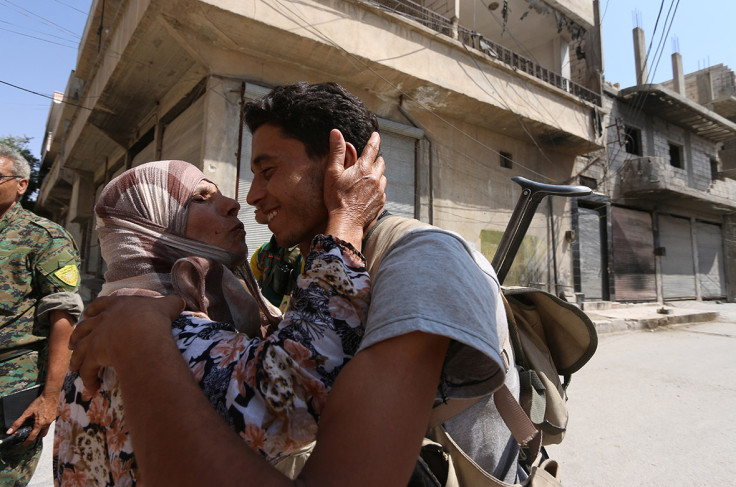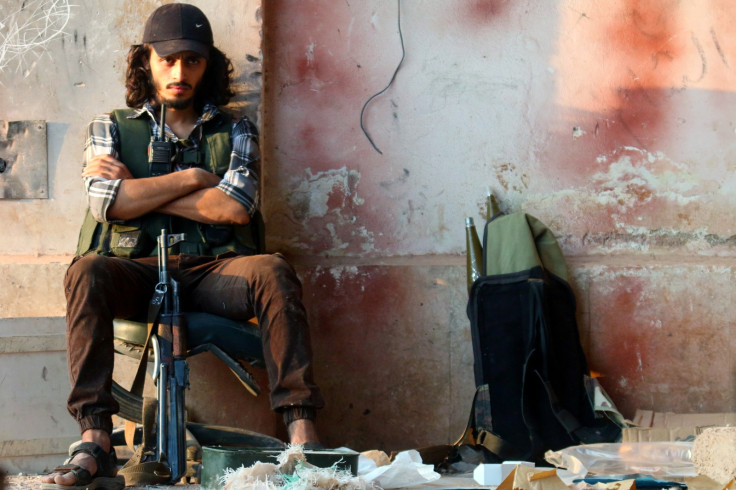Robert Fisk won't tell the truth on Syria because, like Bashar al-Assad, he fears it
At every major point of the war, Fisk has trumpeted Assad regime and Russian propaganda.

As many celebrated the Syrian rebels' extraordinary victory in breaking the siege of Aleppo last week, thus averting the potential starvation of hundreds of thousands, one person who won't be so enthusiastic is The Independent's Middle East correspondent Robert Fisk. As he stated in an article published on 4 August, during the height of the rebel counter-offensive against pro-Assad forces, "there are no good guys among the Syrian warlords".
Fisk is, of course, one of the most experienced Middle East correspondents in the West, with a career in the region spanning back as far as the and the Iranian revolution and the Soviet invasion of Afghanistan. Fisk is widely respected in his journalistic field and is regarded as a safe source for many people across the political spectrum when it comes for Middle Eastern affairs. It's for this reason that one can only lament the fact that Fisk has, since the beginning of the Syrian revolution, become more of a peddler of propaganda than a serious journalist.
Things didn't begin well for Fisk regarding his coverage of the Syrian revolution. In a 2005 article for The Independent, Fisk very aptly warned of the dangers of journalists "embedding" with the British and US armed forces during the Iraq war due to it undermining journalistic integrity for the sake of security.
Fast forward to 2012, however, at a time when the Assad regime, backed by Iran and Hezbollah, had unleashed a war of annihilation against revolutionary Syrians, and, in a reversal of his earlier appeals against journalists sacrificing integrity for security, Robert Fisk decides to embed himself right among the Assad regime forces in Aleppo and Damascus. As other western journalists were risking their lives to report Assad's massacres of civilians, including The Sunday Times' Marie Colvin, who was killed by the Assad regime in what they called an accident, but which was almost certainly not (one suspects that this is what journalists who report the truth on Syria get, as opposed to those who simply push propaganda).
As you'd expect, from Fisk's unscrupulous start in Syria, things went downhill in terms of his coverage. At every major point of the war, Fisk has trumpeted the Assad regime and Russian propaganda. In August 2012, after the Assad regime had unleashed its death squads on residents of the town of Darayya, a hotspot for protests against Assad and rebel activity, murdering between 200-500 people, Fisk chose to peddle the absurd Assad regime line that it was actually the rebels who committed the massacre.
Fisk knows very well that the armed opposition have committed few atrocities.
This has been Fisk's modus operandi when it comes to covering Syria – sure, he might concede that the Assad regime is brutal and, as with Houla where even the worst apologist had difficulty denying Assad's massacre there, he'll even concede Assad has carried out massacres, but this is always "balanced" by regime talking points. If he's forced to reference Houla, he'll make sure that the massacre is contrasted to the alleged crimes of the "armed opposition", which he almost always links to "al-Qaeda".
He repeated the same drill with the Ghouta massacre, where he failed to report on one iota of the vast evidence demonstrating the regime carried out the attack, but instead promoted the idea that Assad's main backer Russia had evidence proving that Assad could not have been responsible (the evidence never materialised and Fisk never followed it up).
Fisk knows very well that the armed opposition have committed few atrocities and that they don't even compare to the daily near-genocidal violence of the regime and its Russian and Iranian allies. He also knows that the vast majority of rebel fighters are not al-Qaeda, but he must engender the idea that "there are no good guys" in Syria.

One might think this position belies a neutrality on the part of Fisk, but it's the very opposite. Take his most recent article on Aleppo – Fisk's assertion that "there are no good guys" would be easier to believe if it was him who had not written a virtual paean to Assad's Armed Forces in October 2015, wherein he concludes with a passionate rant, gushing that the "Syrian Army" is going to come out of this war "the most ruthless ... battle-hardened ... Arab army in the region ... woe betide any of its neighbours who forget this." Fisk has also argued that the Assad regime is a lesser of two evils that the West ought to support. This is what Fisk really means when he talks of "no good guys".
Fisk is keen to push the idea that the Assad's forces are still the "Syrian Arab Army", but he might be the only journalist in the world left peddling this absurdity. In his article on Aleppo, Fisk writes that "in Aleppo, Sunni Muslim militias are fighting largely Sunni soldiers of the Syrian army", but the "Syrian army" Fisk speaks of is entirely imaginary. The Syrian Arab Army essentially ceased to exist – the vast majority of the fighting is done by Shia jihadists from Iraq, Afghanistan and Lebanon, assembled by Iran and led by their Revolutionary Guards – of the Syrians that do fight for Assad, very few are Sunni, with the majority being Alawites recruited (often by force) to the Iranian-funded and trained "National Defence Forces".
Fisk is concealing that rebel forces are overwhelmingly Syrian and local.
Take a look at the pro-Assad forces that took part in the partially staged reclaiming of Palmyra from the retreating Islamic State – you had Shia Afghan and Iraqi militias making up the majority of the infantry, under the command of Iranians. The same scenario is playing out across most fronts in Syria, Aleppo included.
And this is precisely what Fisk is concealing from his readers – the rebel forces are overwhelmingly Syrian and local and they are fighting to defend not just their communities and their families from Assad, Iran and Russia's brutality, but also the liberty that they have tasted for the four years since the rebels liberated areas of Aleppo. Fisk will write all day about how the rebels are all Sunni sectarians who are hell bent on murdering Christians (he might want to check out the recent statement by Jasih al-Fatah, one of the main rebel coalitions in Aleppo, where they guarantee the safety of Christians and other minorities) but he won't talk about the mass mobilisation of the ordinary people of Aleppo when the rebels first began to break the siege.
He won't write about the children rolling tyres along the street to be burnt in order to create a makeshift no-fly zone to protect the rebels and themselves from Russia and Assad's brutal air force. He won't write about the fact that in the areas of Aleppo held by rebels for the past four years, civil councils and local coordinating committees were set up to govern the city as best as they can amidst the barrel bombs and missiles, free from Assad's tyrannical rule. It's this spirit that led the Syrian rebels to triumph over the mostly foreign forces that are fighting to crush the very seeds of a Free Syria. If one does not determine this as "good", then they truly are lost.
Robert Fisk won't write about all this because he, like the Assad regime, fears it.
Sam Hamad is a Scottish-Egyptian writer based in Edinburgh. He specialises in Middle Eastern affairs
© Copyright IBTimes 2024. All rights reserved.






















